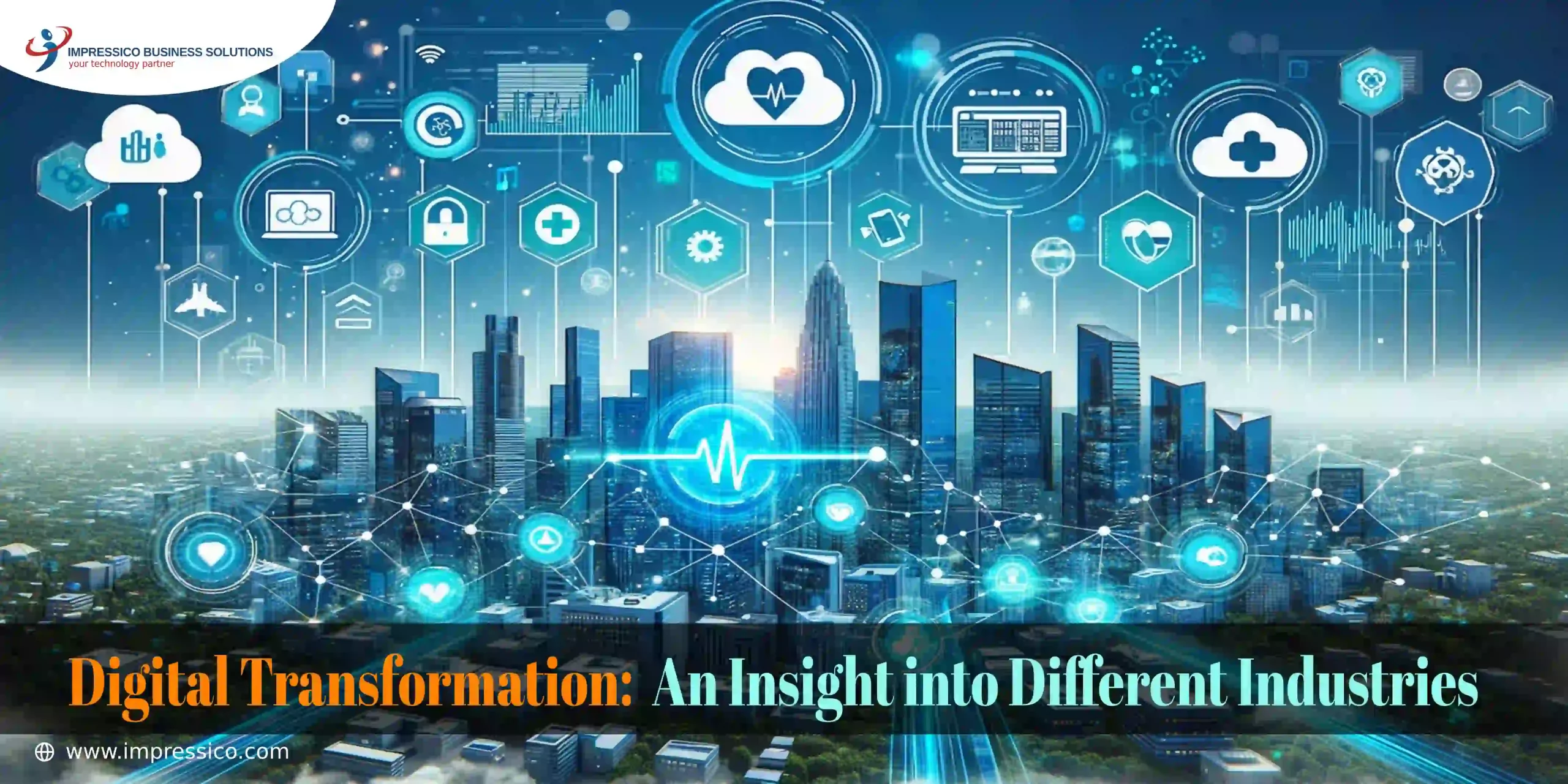Digital Transformation: An Insight into Different Industries

Digital technology is advancing at an incredible pace, and companies are taking advantage to beat their competitors and serve their customers better. According to the 2018 State of CIO Report, 40 percent of IT budgets are now allocated to the explicit purpose of digital transformation, regardless of industry. In addition, 70 percent of companies stated that they already have a digital transformation strategy or are working on its implementation.
While all of these organizations may share the overall goal of digital transformation, the way in which these initiatives are implemented can vary greatly depending on company size, product, internal workflow, customer base, and more. One of the most important factors in digital transformation is the specific industry of the company – how is it practiced?
Below we discuss the impact of digital transformation on 7 different industries and the lessons we can learn from each.
Digital Transformation in 6 Different Industries
1. Digital Transformation in Retail
As a customer-oriented industry, retail is winning over the many diverse opportunities that digital transformation offers. On the one hand, many retailers are researching how they can use customer analytics more intensively and effectively. This includes everything from adjusting the number of products available in stock to predicting which e-commerce purchases are most likely to be returned.
A report by McKinsey & Company shows that savvy analysts are 23 times more likely to get new customers and 19 times more likely to be highly profitable. Augmented and virtual reality experiences can be offered to shoppers for retail stores and e-commerce stores. According to Goldman Sachs, the AR/VR retail market will total $1.6 billion by 2025 and affect approximately 32 million consumers.
Many retailers have used AR/VR to show customers what a product or item of clothing looks like in reality. For example, the IKEA Place mobile app uses augmented reality to combine virtual images of furniture with smartphone camera input so users can visualize how they would be placed in a room.
2. Digital Transformation in Manufacturing
Much has been written about the effects of digital transformation on manufacturing, where “smart factories” are experiencing a revolution in automation and big data in “Industry 4.0”. In addition, the emergence of the Internet of Things (IoT) is very influential in digital transformation initiatives in manufacturing, known as the Industrial Internet of Things (IIoT).
For example, IoT devices – from temperature and air pressure sensors to infrared cameras – strategically placed throughout a factory can monitor devices and gather valuable insights that would otherwise be invisible to human employees. Another transformative digital technology is the “digital twin”, a virtual model that simulates an object or process to identify and avoid potential problems before they become real problems.
3. Digital Transformation in Healthcare
By being open to new treatments and technologies, the healthcare industry has the potential to dramatically improve the quality of patient care.
Computer vision and artificial intelligence, while widely used in various industries, are invaluable in healthcare. For example, healthcare professionals in the United States are exhausted, leading to (sometimes life-threatening) problems such as misdiagnosis and patient identification.
A trained computer vision system, if necessary supplemented by expert human input, can help correct these errors. Such an AI system, trained on CT scans of the patient’s lungs, can detect the presence of COVID-19 pneumonia with up to 90% accuracy, while a fast and high-precision facial recognition system can verify and confirm the identity of the patient only employees have access to restricted areas. Wearable technology and telehealth are two other digital technologies that are transforming healthcare.
4. Digital Transformation in Sales and Marketing
Digital transformation projects are also having a radical impact on the way sales and marketing professionals do their jobs. According to a survey of decision-makers in B2B marketing from 2019, 81% view digital transformation as “the key to their business”. The main priorities of these movers and shakers are “activation of more digital media and channels”, use of targeting and segmentation data, use of lead scoring and implementation of sales/marketing.
A dedicated customer relationship management (CRM) system should be at the core of any digital transformation initiative for sales and marketing. Among other things, CRM software can automatically monitor and record all interactions between sales specialists and potential buyers.
In this way, CRM systems help provide a more personalized and meaningful sales pitch that is more likely to address potential customer concerns. Automating the sales process will also greatly increase the productivity of your sales team – salespeople only spend 36 per cent of their time actually selling.
Plus, choosing the right CRM system will have a positive impact on the rest of your business: for example, CRM software can also be integrated with advanced data and analytics tools to help sales teams make better forecasts and generate intelligent and useful insights.
5. Digital Transformation in Telecommunications
According to Bain & Company, a successful digital transformation in the telecommunications industry can increase EBITDA and customer satisfaction by up to 30 per cent while increasing employee satisfaction by more than 50 per cent. Like manufacturing, the telecommunications industry is one of the most to benefit from the increasing adoption of IoT technology.
It contains: More internet-connected devices generating more data and exchange information with each other, from phones and tablets to smartwatches and other wearables to cars and kitchen appliances.
IoT sensors and cameras that use cell towers and other devices to detect potential security risks and breaches in remote areas – from potential thieves to natural disasters such as fires, earthquakes and hurricanes.
In particular, the continued deployment of 5G networks is a potential game-changer for telecom companies. With so many locations catering to the consumer market, 5G is considered one of the biggest revenue opportunities in the telecommunications industry. Telecommunication companies that benefit from the increased productivity, reliability and mobility of 5G are best positioned to succeed in the short to medium term.
6. Digital Transformation in Transportation and Logistics
Last but not least, digital transformation in the transportation and logistics industry can help companies deliver faster and more cost-effective services and outperform their competitors. The most common challenges in the transportation and logistics industry include inadequate use of resources and equipment, inefficiencies in the supply chain, and problems with integration and visibility across multiple systems.
According to Harshit Sharma, an analyst at Lux Research: “Currently, digital transformation of logistics is in its infancy and offers a host of opportunities for further development.” As in many other industries, increased investment in data and analytics comes at a cost for transportation and logistics. Data-driven data can help these companies speed up their workflows, make better forecasts, and even develop new business ideas and models.
Technologies like IoT now offer greater transparency in the supply chain and ensure that the process is transparent from start to finish. Some companies have even experimented with using blockchain, a decentralized registration technology that is extremely difficult for malicious actors to modify, track shipments and ensure the authenticity of their products.
Bottom Line: Cross-Industry Impact of Digital Transformation
From retail and manufacturing to healthcare and transportation, no industry is left untouched by digital transformation Services – which is why it’s so important to make sure you don’t fall behind.
Unlocking Digital Fortresses: FAQs on Digital Insight into Industries
How does digital transformation impact cybersecurity strategies?
Explore how digital transformation initiatives necessitate advanced cybersecurity measures, including the integration of AI and machine learning for threat detection and response.
What are the privacy concerns associated with digital transformation?
Discuss the increased risk of data breaches and privacy issues that come with digital transformation, and how companies can mitigate these risks.
How can businesses ensure compliance with data protection regulations during digital transformation?
Outline the importance of incorporating compliance into the digital transformation strategy, including the role of GDPR, CCPA, and other data protection standards.
What role does blockchain technology play in cybersecurity and privacy?
Examine how blockchain is being used to enhance security and privacy in digital transactions and data management.
